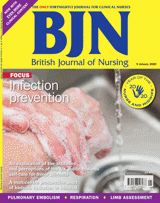References
An exploration of the attitudes and perceptions of the UK public towards self-care for minor ailments
Abstract
Aims and objectives:
the purpose of this pilot study was to explore the attitudes and perceptions of members of the UK public towards self-care for minor ailments.
Background:
with an ageing and increasing population, and an NHS under extreme pressure, methods to reduce demand on health services are vital. Increasing the use of self-care for minor ailments is one way in which this pressure could be alleviated.
Design and method:
this study used qualitative methods including semi-structured telephone interviews. The data were then evaluated, and key themes drawn out using thematic analysis.
Findings:
the results showed that the public are aware of the notion of self-care, and some are engaging with it. However, for a number of reasons, patients are still likely to want a face-to-face appointment despite the use of online and telephone advice services.
Conclusion:
the study highlighted that there are multifactorial aspects impacting on a patient's likelihood of engaging in self-care when faced with a minor illness. The results are not generalisable to every member of the public, but interesting questions are raised with regard to the usefulness of current public health messages in various media when there appears to be a lack of desire from the public to use some recommended services.
The population of the UK continues to grow and to age. It is predicted that by 2041 the population will reach 72.9 million and by 2038 24.2% of the population will be over the age of 65 years (Office for National Statistics, 2019). The NHS is already experiencing unprecedented pressures, with deteriorating performance indicators (Murray et al, 2018) and an ever-increasing chasm between the cost of treatments and the funding available (Gainsbury, 2017). It is highly probable that this growth in numbers and the ageing population will only exacerbate these problems in years to come.
In a March 2018 review of NHS performance, The King's Fund (Murray et al, 2018) asked clinical commissioning group (CCG) finance leads how confident they were about the ability of general practice to meet demand—67% of CCGs felt concerned or very concerned. If general practice can be seen as the gateway to the health service, then unachievable targets with regard to capacity have a knock-on effect on the NHS as a whole. There is an increasing trend towards patients attending their GP with minor illness that could be managed at home before medical review is needed (Baird et al, 2016). Understanding the reasons behind this may help in enabling people to feel confident in their own ability to self-care, reducing some of the pressures on the NHS.
Register now to continue reading
Thank you for visiting British Journal of Nursing and reading some of our peer-reviewed resources for nurses. To read more, please register today. You’ll enjoy the following great benefits:
What's included
-
Limited access to clinical or professional articles
-
Unlimited access to the latest news, blogs and video content

